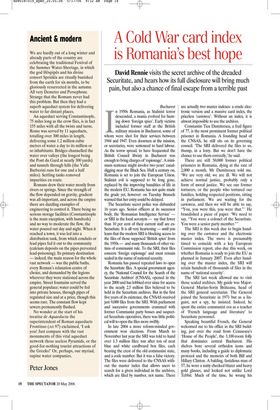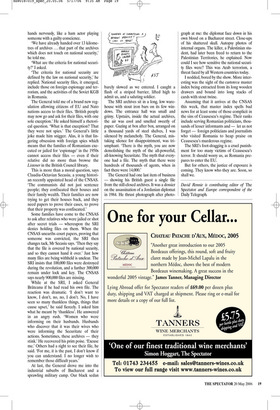A Cold War card index is Romania’s best hope
David Rennie visits the secret archive of the dreaded Securitate, and hears how its full disclosure will bring much pain, but also a chance of final escape from a terrible past
Bucharest
In 1950s Romania, as Stalinist terror descended, a mania evolved for hunting down ‘foreign spies’. Early victims included former staff at the British military mission in Bucharest, some of whom were shot for their services between 1944 and 1947. Even doormen at the mission, or secretaries, were sentenced to hard labour. As the terror spread, to have frequented the British Council library in Bucharest was enough to bring charges of ‘espionage’. A minimum sentence might involve two years’ canaldigging near the Black Sea. Half a century on, Romania is set to join the European Union. Stalinist evil is supposed to be long gone, replaced by the improving banalities of life in the modern EU. Romania has not quite made the grade yet, however: on Tuesday Brussels warned that her entry could be delayed.
The Securitate secret police was disbanded 16 years ago. Senior officers at its successor body, the ‘Romanian Intelligence Service’ or SRI in the local acronym — say that fewer than 10 per cent of their current staff are exSecuritate. It is all very heartening — until you learn that the modern SRI is blocking access to the files of those supposed ‘British spies’ from the 1950s — and many thousands of other victims of communist rule. To the SRI, their files concern ‘foreign espionage’ and must remain sealed in the name of national security.
Romania has passed repeated laws to open the Securitate files. A special government agency, the ‘National Council for the Search of the Securitate Archives’ (CNSAS), opened in the year 2000 and has lobbied ever since for access to the nearly 2.5 million files believed to be held in the Securitate archives. But in the first five years of its existence, the CNSAS received just 9,000 files from the SRI. With parliament and successive governments crammed with former Communist party bosses and suspected Securitate operatives, there was little political will to open the files more swiftly.
In late 2004 a more reform-minded government won elections. From March to November last year the SRI was told to hand over 1.3 million files: ton after ton of neat blue and white cardboard box files, each bearing the crest of the old communist state, and a code number. But it was a false victory. The files were delivered to the CNSAS without the master index that allows users to search for a given individual in the archives, which are filed by number, not name. There are actually two master indexes: a crude electronic version and a massive card index, the priceless ‘cartoteca’. Without an index, it is almost impossible to use the archives.
Constantin Ticu Dumitrescu, a frail figure of 77, is the most prominent former political prisoner in Romania. A founding head of the CNSAS, he still sits on its governing council. ‘The SRI delivered the files to us, thump, in a lorry. But we don’t have the chance to use them correctly,’ he said.
There are still 50,000 former political prisoners in Romania, dying at the rate of 2,000 a month, Mr Dumitrescu told me. ‘We are very old, we are ill. We will not achieve normal justice, probably only a form of moral justice. We see our former torturers, or the people who tortured our families, holding respected positions, sitting in parliament. We are waiting for the cartoteca, and then we will be able to say, “You, you were this, you were that.”’ He brandished a piece of paper. ‘We need to say, “You were a colonel of the Securitate. You were a senior party member.”’ The SRI is this week due to begin handing over the cartoteca and the electronic master index. The move is presumably timed to coincide with a key European Commission report, also due this week, on whether Romania is ready to join the EU as planned in January 2007. Even after handing over the master index, the SRI will retain hundreds of thousands of files in the name of ‘national security’.
The SRI last week allowed me to visit those sealed archives. My guide was MajorGeneral Marius-Sorin Brãteanu, head of the SRI general secretariat. The General joined the Securitate in 1971 but as a linguist, not a spy, he insisted. Indeed, he spent the entire communist era as a teacher of ‘French language and literature’ to Securitate personnel.
Speaking beautiful French, the General welcomed me to his office in the SRI building, just over the road from Ceausescu’s ‘House of the People’, the 3,100-room folly that dominates central Bucharest. His shelves bore several orthodox icons and many books, including a guide to diplomatic protocol and the memoirs of both Bill and Hillary Clinton. A balding, fastidious man of 57, he wore a natty checked blazer and heavy gold glasses, and looked not unlike Lord Tebbit. Much of the time, he wrung his hands nervously, like a ham actor playing someone with a guilty conscience.
‘We have already handed over 13 kilometres of archives ... that part of the archives which does not touch on national security,’ he told me.
‘What are the criteria for national security?’ I asked.
‘The criteria for national security are defined by the law on national security,’ he replied. National security files, it emerged, include those on foreign espionage and terrorism, and the activities of the Soviet KGB in Romania.
The General told me of a brand new regulation allowing citizens of EU and Nato nations access to their files. ‘British people may now go and ask for their files, with one sole exception.’ He asked himself a rhetorical question. ‘What is that exception? That they were not spies.’ The General’s little joke made him snigger. Alas, it is that lingering obsession with foreign spies which means that the families of Romanians executed or jailed for ‘espionage’ in the 1950s cannot access their files — even if their relative did no more than browse the Listener in the British Council library.
This is more than a moral question, says Claudiu-Octavian Secasiu, a young historian recently appointed head of the CNSAS. ‘The communists did not just sentence people; they confiscated their houses and their family wealth. Their families are now trying to get their houses back, and they need papers to prove their cases, to prove that their property was confiscated.’ Some families have come to the CNSAS to ask after relatives who were jailed or shot after secret trials — whereupon the SRI denies holding files on them. When the CNSAS unearths court papers, proving that someone was convicted, the SRI then changes tack, Mr Secasiu says. ‘Then they say that the file is covered by national security, and so they cannot hand it over.’ Just how many files are being withheld is unclear. The SRI insists that 100,000 files were destroyed during the revolution, and a further 300,000 remain under lock and key. The CNSAS says nearly 900,000 files are missing.
While at the SRI, I asked General Brãteanu if he had read his own file. The reaction was dramatic. ‘I don’t want to know, I don’t, no, no, I don’t. No, I have seen so many thankless things, things that cause upset,’ he said fiercely. I asked him what he meant by ‘thankless’. He answered in an angry rush. ‘Women who were informing on their husbands. Husbands who discover that it was their wives who were informing the Securitate of their actions. Sometimes, these archives — they stink.’ He recovered his prim poise. ‘Excuse me.’ Others had a right to see their file, he said. ‘For me, it is the past, I don’t know if you can understand. I no longer wish to remember those difficult years.’ At last, the General drove me into the industrial suburbs of Bucharest and a sprawling military camp. Our black sedan barely slowed as we entered. I caught a flash of a striped barrier, lifted high to admit us, and a saluting soldier.
The SRI archives sit in a long, low warehouse with stout iron bars on its few windows. The entrance hall was small and grimy. Upstairs, inside the actual archives, the air was cool and smelled sweetly of paper. Gazing at box after box, arranged on a thousand yards of steel shelves, I was silenced by melancholy. The General, mistaking silence for disappointment, was triumphant. ‘There is the myth, you are now demolishing the myth of the all-powerful, all-knowing Securitate. The myth that everyone had a file. The myth that there were hundreds of thousands of agents, when in fact there were 14,000.’ The General had one last item of business — showing his British guest a single file from the still-closed archives. It was a dossier on the assassination of a Jordanian diplomat in 1984. He thrust photograph after photo graph at me: the diplomat face down in his own blood on a Bucharest street. Close-ups of his shattered skull. Autopsy photos of internal organs. The killer, a Palestinian student, had later been freed to return to the Palestinian Territories, he explained. Now could I see how sensitive the national security files were? This was Arab terrorism, a threat faced by all Western countries today.
I nodded, bored by the show. More interesting was the sight of the cartoteca master index being extracted from its long wooden drawers and bound into long stacks of cards with stout twine.
Assuming that it arrives at the CNSAS this week, that master index spells bad news for at least some of those complicit in the sins of Ceausescu’s regime. Their ranks include serving Romanian politicians, thousands of lesser informants and — let us not forget — foreign politicians and journalists who visited Romania to heap praise on Ceausescu’s murderous regime.
The SRI’s foot-dragging is a cruel punishment for too many victims of Ceausescu’s terror. It should worry us, as Romania prepares to enter the EU.
But for others, the justice of exposure is coming. They know who they are. Soon, so shall we.



















































































 Previous page
Previous page